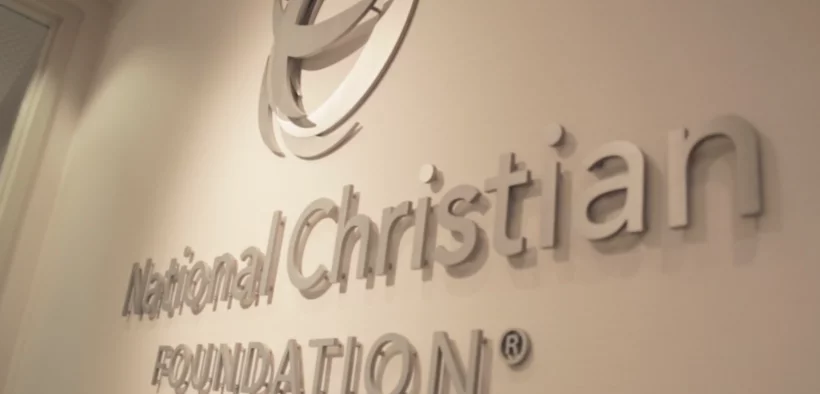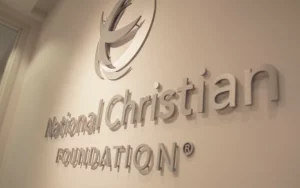National Christian Foundation is Quiet but Influential Giant

Asked to name the biggest Christian charities, people might mention The Salvation Army, World Vision, or Compassion International.

Most wouldn’t think to mention the National Christian Foundation, a quiet but huge philanthropic nonprofit that has consistently ranked among the top 10 charitable enterprises in the U.S. and is the world’s largest Christian foundation, based on assets ($5.3 billion) and annual grantmaking.
NCF received $2.5 billion in donations in 2020, and distributed $1.3 billion in grants to thousands of groups. Since its founding in 1982, it has taken in $17 billion and granted $14 billion to 71,000 nonprofits.
If you’re not familiar with NCF, which is based in the Atlanta area and has 30 offices around the country, you’re not alone. The Atlanta Journal-Constitution called NCF a “massive, mysterious charity” and “one of the most influential charities you’ve never heard of.”
But nonprofits and philanthropic advisors know NCF well, and many groups, both big and small, depend on grants from NCF for a significant share of their annual budgets.
NCF, which bills itself as “a like-minded ministry you can trust,” was founded as the National Christian Charitable Foundation by Atlanta tax attorney Terry Parker and popular evangelical financial gurus Ron Blue and Larry Burkett. Blue and Burkett taught an earlier generation of increasingly well-off evangelicals how to manage and steward their money, and helped bring in the first major donors. Since then, word-of mouth has remained the main source of new clients.
Access to MinistryWatch content is free. However, we hope you will support our work with your prayers and financial gifts. To make a donation, click here.
NCF currently serves some 25,000 individual and family givers, but spends relatively little ($1.6 million) on marketing, publicity, or social media. Its weekly “Saturday 7” email digest of philanthropic news has 40,000 subscribers.
This quiet, word-of-mouth strategy seems to be working just fine, as 2020 income surpassed 2019 income by more than $1 billion. “God has blessed our ministry by giving us opportunities, bringing donors our way, and connecting us with advisors,” said Chapman, who said 2020 was NCF’s “best year ever” in terms of incoming donations and outgoing grants—and that so far, “2021 is better yet.”
It was Parker who had the technical know-how to help NCF pioneer Donor Advised Funds for Christian givers, receiving permission from the Internal Revenue Service for NCF’s model. That model allows donors to advise on which charities receive grants and whether their remaining funds are invested aggressively or conservatively.
Parker left behind a growing law career and possible judgeship to help Christians manage their giving, and his expertise enabled NCF to become a pioneer in accepting non-cash assets, including securities, businesses, and real estate. His tax expertise helped donors give more and pay less in taxes to Uncle Sam.
NCF coaches donors to develop a “giving strategy” that matches their objectives, and offers donors a wide range of giving options through its dozens of related organizations. Giving is anonymous. NCF does not reveal its donors’ names to the IRS or, in some cases, even to the charities receiving grants.
NCF’s 2020 overhead and administration expenses totaled $108 million, up from $82 million in 2019. But that figure doesn’t include expenses from approximately 25 of NCF’s 30 offices, which are separate legal entities that incur their own expenses and file their own taxes. NCF employs 300 people.
Steve Chapman, NCF’s vice president of communications, joined the organization in 2004 after working for the DeMoss Group, a Christian communications company that closed in 2019. “I wanted to do something that would further God’s work,” he says.
Chapman says he and other employees are united in their “love of the Lord,” their desire “to further his work around the world,” and the knowledge that “our work is funding countless other ministries that are feeding the hungry, providing water to the thirsty, giving homes to the homeless, rescuing those in sex trafficking, supporting healing and recovery efforts” that help people dealing with natural disasters.
Employees also do community service projects in the Atlanta area, wearing their “Love Gives” t-shirts as they help build homes or join other volunteer efforts.
Funding good works
Every year, NCF grants millions to groups doing good, including churches, evangelistic and missionary agencies, humanitarian aid ministries, educational institutions, and orphan care ministries.
The 2019 grants are spelled out in NCF’s 593-page 990 form, which is downloadable and searchable from Guidestar. (NCF posts a 48-page version that omits grants on the “Our financials” page of its website.)
An internal report summarized major grants in 2019:
Church : $215,075,447.93
Evangelism and Missions: $86,573,998.99
Humanitarian Aid and Development: $70,342,334.32
Education: $65,303,733.56
Colleges and Universities: $59,662,183.07
Children’s and Youth Ministry: $57,357,430.26
Museums: $56,919,053.00
Spiritual Development: $56,402,081.05
Community Development: $31,474,976.50
Media and Publishing: $28,145,120.81
Orphan Care: $26,892,252.64
Bible Translation: $24,751,061.04
Student Ministry: $23,824,906.55
Leadership Development: $20,907,509.33
Medical Care: $20,825,116.21
Homelessness: $20,014,003.42
Church Planting: $19,830,836.79
But the above list omits grants made in 2019 to sometimes controversial groups that focus on divisive issues in the areas of “culture” and “justice,” including some groups that have been criticized for spreading hate and sowing discord between Americans.
Funding hate?
NCF funds groups—religious and secular—that claim Democrats want to create “one-party control much like they have in Cuba, Venezuela, and Russia;” question efficacy of COVID vaccines and oppose mandates; reject 2020 elections and endorse members of Congress who voted to overturn Electoral College results; claim that Antifa/BLM was behind the attack on the U.S. Capitol on Jan. 6; and argue that Islam is not a religion, but a military/economic/judicial system that is incompatible with the U.S. Constitution, which does not protect Muslims.
Such grants have generated news stories with headlines like this one: “America’s Biggest Christian Charity Funnels Tens of Millions to Hate Groups.”
A 2021 article in the Chronicle of Philanthropy reported that 351 “hate” groups had received $53 million from charities and foundations from 2013 to 2018, and that the National Christian Foundation led the way.
The “hate” designation is based in part on work by the Southern Poverty Law Center, which labels groups that oppose advocacy for LGBTQ issues, demean immigrants, or demonize Muslims.
Among the groups SPLC identifies as hate groups are two groups founded by Focus on the Family—Alliance Defending Freedom and Family Research Council—along with the American Family Association, Liberty Counsel, Pacific Justice Institute, the American Freedom Law Center, and the David Horowitz Freedom Center.
NCF’s 2019 990 shows it is now granting less to these groups than in previous years, with Alliance Defending Freedom receiving $6.6 million and Family Research Council receiving $3.5 million. The anti-Muslim David Horowitz Freedom Center received no funding from NCF in 2019.
NCF’s Steve Chapman says NCF does not “rely on third-party designations and labels in our grant making process,” which is “initiated by givers themselves. We don’t proactively decide where to make grants. Everything starts with the giver.”
NCF makes grants to nonprofits that are approved by the IRS and don’t conflict with its stated beliefs and values, including “the sanctity of life, sexuality, gender, and marriage; and the inspiration and authority of Scripture.”
Groups advocating for LGBTQ issues are in violation of these beliefs and values. But secular advocacy groups, such as the American Enterprise Institute, and Americans for Prosperity Foundation, which is part of the Koch brothers’ libertarian work, don’t conflict with these beliefs, and receive grants.
Chapman also said that while NCF does evaluate individual charities’ overall mission and purpose, “we don’t keep track of individual activities of every charity.”
Putting gifts to use
While many have criticized DAFs for parking donor money rather than giving it to groups that will use it, Chapman says there are legitimate reasons for donors to spread giving out over time. Some families want their wealth to last long enough to get their children—and possibly even grandchildren—involved in giving decisions. Others pace donations because they don’t want to give charities money faster than they can properly and beneficially use it.
Chapman says the goal is to honor donors’ wishes by quickly getting funds to nonprofits that need it, and says he believes NCF has “the highest grant making payout rate” of any provider in the country.
Different groups use different calculations to determine their payout rates. Chronicle of Philanthropy calculated that NCF had a payout rate of 40%, but Chapman says the actual rate is closer to 80%.
“As far as the Lord leads people, we want people to get money to ministries as fast as possible.”



